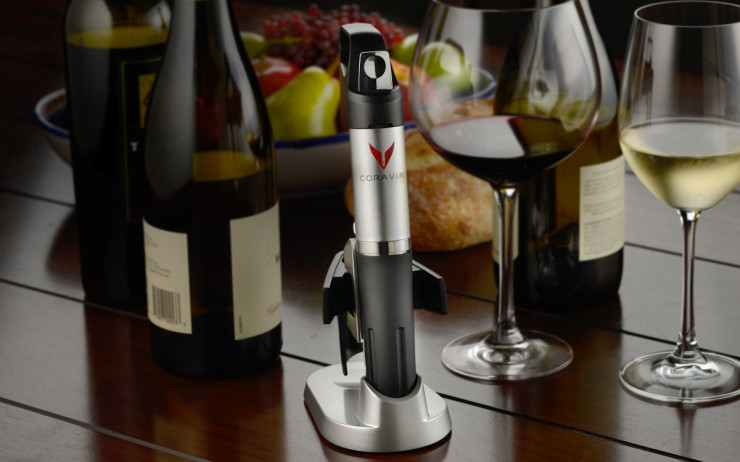
If you like to sip on a glass of wine now and then, rather than to chug a whole bottle like a man, perhaps we can interest you in the Coravin gadget: it lets you extract some wine without even removing the cork. It does this by inserting a thin needle through the cork and allowing you to remove some liquid while replacing the displaced air with inert argon gas. This way the remaining wine won’t oxidize and eventually go bad. The needle is so thin that the cork reseals itself, and the bottle remains as good as unopened for as long as you have it. Granted, you could just try to recork it, but that’s often hard to do and the sometimes brittle wood can crumble. Not good.
Coravin is rather expensive at $299 for the system plus $10 for each Argon cartridge and may only be suitable for the more well-heeled oenophiles. Restaurants on the other had would be well advised to take a closer look, since this could allow them to hold a much larger selection of wines that can be sold by the glass.
[ Product Page ] VIA [ Mashable ]

 With current technology, a human liver donated for transplant can only be kept alive for 24 hours, and often, if the liver is damaged or diseased, it cannot be considered for transplant. That could soon change. Liver4Life, a Wyss Institute project, h...
With current technology, a human liver donated for transplant can only be kept alive for 24 hours, and often, if the liver is damaged or diseased, it cannot be considered for transplant. That could soon change. Liver4Life, a Wyss Institute project, h...
 With current technology, a human liver donated for transplant can only be kept alive for 24 hours, and often, if the liver is damaged or diseased, it cannot be considered for transplant. That could soon change. Liver4Life, a Wyss Institute project, h...
With current technology, a human liver donated for transplant can only be kept alive for 24 hours, and often, if the liver is damaged or diseased, it cannot be considered for transplant. That could soon change. Liver4Life, a Wyss Institute project, h...
 How AI-generated music is changing the way hits are made
Dani Deahl,
The Verge
The rise of streaming services is one of many challenges the music industry is currently having to contend with. In the latest installment of its "The Future of Music"...
How AI-generated music is changing the way hits are made
Dani Deahl,
The Verge
The rise of streaming services is one of many challenges the music industry is currently having to contend with. In the latest installment of its "The Future of Music"...
 The British Film Institute (BFI) has a plan in motion to save old, at-risk TV programmes stored on obsolete video formats. As part of a new five-year strategy, the organisation has vowed to digitise and preserve "at least 100,000" shows for future ge...
The British Film Institute (BFI) has a plan in motion to save old, at-risk TV programmes stored on obsolete video formats. As part of a new five-year strategy, the organisation has vowed to digitise and preserve "at least 100,000" shows for future ge...
 There are some books that are simply too delicate to crack open -- the last thing you want to do is destroy an ornate medieval Bible simply because you're curious about its contents. If MIT has its way, though, you won't have to stay away. Its scient...
There are some books that are simply too delicate to crack open -- the last thing you want to do is destroy an ornate medieval Bible simply because you're curious about its contents. If MIT has its way, though, you won't have to stay away. Its scient...

